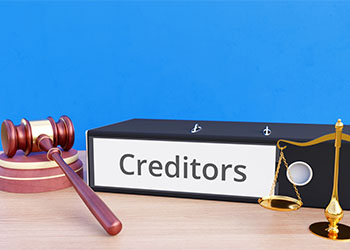Understanding Creditor’s Rights and Limitations
May 9, 2022
 If you miss a payment or two on a loan or credit card, you can expect to start receiving phone calls, emails, and text messages to remind you that your account is past due. The longer your payments are missed, the more collection attempts you can expect – and will be subjected to. Is there a limit to what these creditors can do?
If you miss a payment or two on a loan or credit card, you can expect to start receiving phone calls, emails, and text messages to remind you that your account is past due. The longer your payments are missed, the more collection attempts you can expect – and will be subjected to. Is there a limit to what these creditors can do?
Federal law does indeed restrict the tactics and the time of day creditors can contact you, but if you’re behind in payments, they have every right to try to collect. If all of this, including the debt you owe, becomes overwhelming, you can always resort to bankruptcy. Filing bankruptcy will put a stop to all collection efforts.
Many people fear bankruptcy as meaning a loss of everything they’ve worked for and also as a symbol of failure and shame. Instead, bankruptcy is your sole legal means to achieve a fresh financial start in life and doesn't mean a loss of everything.
The bankruptcy code provides for exemptions that can help you keep your home and car and just about everything in your house, even if you file for a Chapter 7 option. In fact, Texas offers possibly the most generous exemptions in the nation.
If debts are overwhelming you and creditors hounding you endlessly, and you are in the greater Amarillo area or the cities of Borger, Pampa, or Hereford, Texas, contact me immediately at the Swindell Law Firm. I will meet with you, discuss your situation with you, and explain how the bankruptcy system works, so you can begin the process of achieving a fresh start in life.
Consumer Rights Under Federal and State Law
Though creditors and bill collectors have a right to pursue payment of overdue debts, they do face limits and restrictions. Among the federal laws protecting consumers are:
The Fair Debt Collection Practices Act (FDCPA) protects consumers (but not businesses) against credit collector practices. Under the FDCPA, creditors cannot call before 8 a.m. or after 9.m., and they cannot generally call you at work. You also have the right to request them to quit calling you.
The Fair Credit Reporting Act (FCRA) regulates the actions of consumer credit reporting agencies (CRAs) like TransUnion, Equifax and others. The legislation requires these CRAs to keep consumers informed of their credit information being stored and also to verify information disputed by consumers.
A 2003 amendment, called the Fair and Accurate Credit Transactions Act, allows consumers to receive one free credit report each year from each agency.
The main consumer protection statute in Texas is contained in Chapter 17 of the Texas Business and Commerce Code called the Deceptive Trade Practices Act (DTPA). The DTPA has a long list of practices that are against the law, but they largely cover the sale of goods rather than debt practices.
Prohibited Collection Practices
The Federal Trade Commission (FTC) enforces debt collection practices. Among the many protections for consumers, the FTC prohibits creditors and collection agencies from:
Harassing you with endless phone calls
Pretending to be attorneys or government agencies
Using profane or threatening language
Threatening that you’ll be arrested for not paying your bill
Contacting your friends about your obligations
Publicly shaming you on social media or otherwise, even on postcards or letters
Bankruptcy and Consumer Rights
When you file for bankruptcy, the court will put a stop to all calls and collection activities, including even lawsuits, repossessions, and foreclosures, under what is called the “automatic stay.” If creditors continue to hound you, get your bankruptcy attorney involved.
Bankruptcy offers two avenues of relief for consumers.
Chapter 13 is known as the wage earner’s plan, as it allows you to set up a repayment plan using just your disposable income – what’s left over after you’ve met all the essential living expenses for your household. You then have three to five years to pay into the plan, and in the end, even if your debts have not been fully repaid, you will be discharged from bankruptcy and free of unsecured debt obligations like credit cards, hospital bills, and personal loans.
Chapter 7 is the liquidation plan, which means the bankruptcy trustee can sell off non-exempt assets to pay your creditors. As mentioned, however, Texas has some of the most generous exemption packages in the nation. If you own a home, you can protect any amount of equity you have, limited only by the acreage of your property.
For instance, if you have a home valued at $800,000 with a $200,000 mortgage, you then have $600,000 in equity that cannot be touched but you have to keep paying your mortgage to retain your home.
You can also exempt the total value of one motor vehicle per licensed household member. Under Federal Bankruptcy Exemptions the filer gets a wildcard exemption, which could cover as much as $15,425 depending on the amount of your equity in your home. As with all forms of bankruptcy, retirement savings are protected.
Most people prefer to use Chapter 7 because it’s over in a matter of months, not years, but there is a means test to qualify. Your income must fall below the median state income for a household of your size. The median is adjusted regularly for inflation. However, you may still qualify under the means test depending on the secured and priority debt amounts you have.
Legal Guidance You Can Trust
The Swindell Law Firm has helped many others like you with overwhelming debt obtain a fresh life by filing for bankruptcy. Contact me, and let’s assess your situation. After we determine which avenue is best – Chapter 13 or Chapter 7 – I can help you navigate the system to clear out your unsecured debts and start rebuilding your credit for a new future.
I proudly serve clients in the entire Texas panhandle, including Borger, Amarillo, Pampa, Hereford, and Dumas.
